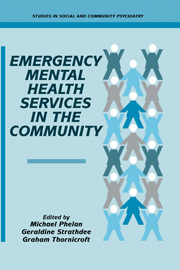Book contents
- Frontmatter
- Contents
- Contributors
- Foreword
- PRINCIPLES AND POLICIES
- CHALLENGE OF IMPLEMENTATION
- 9 Establishing a local emergency service
- 10 Maintaining an emergency service
- 11 Psychiatric emergencies in the casualty department
- 12 Acute crisis respite care
- 13 Family placement schemes as an alternative to short-term hospitalisation
- 14 Acute home-based care and community psychiatry
- 15 Acute day hospital care
- 16 Acute in-patient wards
- 17 The future of mental health emergency services
- Index
12 - Acute crisis respite care
from CHALLENGE OF IMPLEMENTATION
Published online by Cambridge University Press: 28 October 2009
- Frontmatter
- Contents
- Contributors
- Foreword
- PRINCIPLES AND POLICIES
- CHALLENGE OF IMPLEMENTATION
- 9 Establishing a local emergency service
- 10 Maintaining an emergency service
- 11 Psychiatric emergencies in the casualty department
- 12 Acute crisis respite care
- 13 Family placement schemes as an alternative to short-term hospitalisation
- 14 Acute home-based care and community psychiatry
- 15 Acute day hospital care
- 16 Acute in-patient wards
- 17 The future of mental health emergency services
- Index
Summary
Introduction
Acute crisis respite care involves the provision of mental health services in a short-term residential setting that functions as an alternative to acute voluntary psychiatric hospitalisation. For the past two decades, short-term residential alternatives to psychiatric hospitalisation have grown steadily in both the United States and the UK despite the lack of a coherent definition, purpose, or conceptualisation for their use. As employed here, the term ‘acute crisis’ respite care does not include the use of acute hospital stays to provide respite for family members of a severely mentally ill adult (Geiser et al., 1988) or the brief placement of such patients with carefully selected families in the community in order to provide respite to families or residential service providers (Britton & Mattson-Melcher, 1985). Although ‘crisis hostels’ (Brook, 1973) may have represented an early form of acute crisis respite care, crisis respite services are distinct from ‘hostel’ services because the latter usually functions as an alternative to hospital-based institutionalisation for long-stay patients (Gibbons, 1986; Hyde et al., 1987; Simpson et al., 1989).
There is considerable evidence in the literature of the need for acute crisis respite care. Studies of family members of de-institutionalised mental patients consistently indicate a need for respite care among family members (Zirul et al., 1989), including families with members living in board and care homes (Segal & Kotler, 1989). Evidence for this need is also provided by the requests from community providers of severely ill patients (Ghaziuddian, 1988).
- Type
- Chapter
- Information
- Emergency Mental Health Services in the Community , pp. 233 - 258Publisher: Cambridge University PressPrint publication year: 1995
- 1
- Cited by

